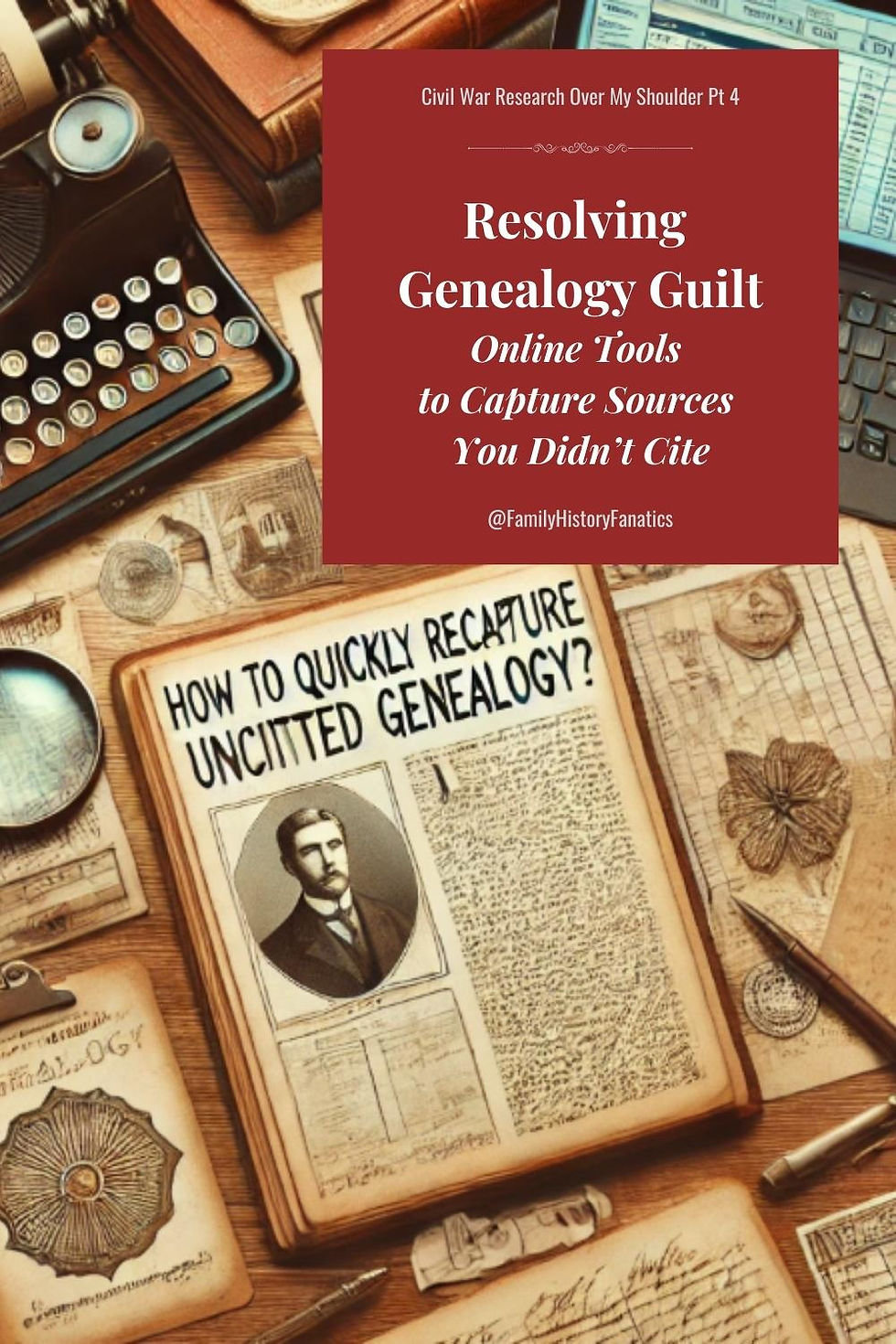Genealogy Guilt: How to Recapture Genealogy Sources You Didn’t Cite - Genealogy Research Quest Pt 4
- Devon Noel Lee
- Nov 4, 2024
- 4 min read
Updated: Nov 12, 2024
Maybe you’ve been there, knee-deep in family research, and somehow missed jotting down the sources for all those fantastic finds. Now you’re staring at a pile of "facts" and wondering, Where did all this come from?
If you've ever felt the pangs of genealogy guilt over uncited sources, you’re not alone. Let me take you on my journey as I faced a citation crisis while researching the Ohio 133rd Infantry—specifically, nearly a thousand men who served alongside my ancestor.
The Quest for a Simple Snapshot… That Got Complicated
It all started innocently enough. I wasn’t setting out to be a leading expert on Company K of the Ohio 133rd. I just wanted a quick snapshot of William Townsend’s service. But two weeks of intense research later, I realized I had a sprawling spreadsheet with details about nearly 1,000 soldiers… and no citations to back any of it up.
You might wonder, Why didn’t I document sources from the start? The truth is, I wanted to avoid getting bogged down by documentation for a project that was meant to be a quick supplement to my story. However, as any genealogist knows, shortcuts can quickly lead to dead-ends—and to a whole lot of guilt.
The Internal Struggle: To Cite or Not to Cite?
After days of combing through data, a nagging guilt started setting in. I had so many questions swirling in my mind:
Should I cite sources for general claims, like "30 of the 90 men in William’s company came from his home village"?
What if someone challenges my claims later? Would they be able to retrace my steps?
And, let’s be honest, what if I just got something plain wrong?
The more I thought about it, the more I realized that a well-organized citation log might be invaluable to future researchers even if my book wouldn't need every source. So, I took a deep breath, rolled up my sleeves, and prepared to capture the sources for my work.
↪️ Are you looking for more genealogy resources?
Grab your copy of FREE Genealogy Research Guides:
Google History: My First Attempt at Backtracking
My first line of attack? Google History. Since my last two weeks had been solely dedicated to Civil War research, I knew my browser history would be a goldmine. I found a Chrome extension to export my search history into a CSV file, which I then imported into a Google Sheet.
I tried using a data mining tool to scrape source details from these URLs, but it quickly became clear that gathering citations from complex sites like Ancestry.com wasn’t going to be easy. Without programming know-how, I decided this method was more hassle than it was worth. Back to square one.
Goldie May’s Semi-Auto Logging Feature: A Beacon of Hope
Then, I remembered Goldie May, a tool that allows semi-automatic logging of genealogy sources. I hoped this would be my solution. I opened URLs from my Google Sheets file, hit “Log this page” in Goldie May, and for a moment, thought I was finally making progress.
Unfortunately, the exported log had its own limitations. While it listed the citation details, it didn’t capture the servicemen’s names in a sortable, spreadsheet-friendly way. And on top of that, the data was cluttered with irrelevant details, leaving me with a hefty cleanup task.
Defeated but not deterred, I decided to try a simpler approach.
Back to Basics: Notepad and Google Sheets
With my other options exhausted, I turned to good old Notepad. I created a citation template and began adding each source manually into a separate Google Sheets file. Once it became unwieldy, I divided it into multiple tabs by company, service record, and individual soldier.
To keep it organized, I even developed a coding system for different sources, like:
1a for the 1860 Census
2a for Civil War Pension
4z for Veteran Headstone Applications
After six weeks (yes, six weeks!) of painstaking work, I finally had a system that worked. It was not quick, but at least my genealogy guilt was somewhat alleviated. Now, if anyone questions my findings, I have a decently organized, citation-backed spreadsheet ready to share.
So, Was It Worth It To Capture Genealogy Source Citations?
Reflecting on this project, I still question whether the effort was worth it. Spending seven months on something meant to be a quick side project wasn’t efficient, to say the least. But the silver lining is the confidence in knowing my research has solid footing.
Now That the Genealogy Guilt Has Dissipated, Why Can't I Write the Family History?
As I wrap up William Townsend’s story, I can’t help but think, What new genealogy challenge awaits? The next post will cover a common frustration every genealogist faces, especially when working online. But in the meantime, I’d love to hear from you!
Do you have any tricks for capturing citations without interrupting the research flow? Or do you have a preferred tool that helps keep genealogy guilt at bay? Share your thoughts below! And, if you’re like me, we’ll swap stories of “quick” projects that took us a bit longer than expected.

.png)

